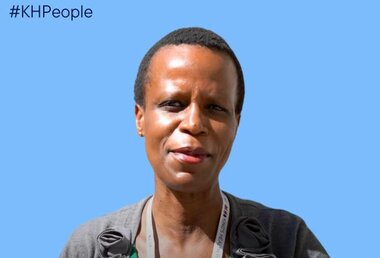23 May 2024
What is your role within King’s Health Partners?
I am one of three deputy directors in KHP Education, with specific interest in leadership education and training, as well as widening participation in healthcare careers. My responsibilities include working with colleagues in the development and implementation of the KHP educational strategy and fostering interdisciplinary collaboration across the KHP partners.
I am a consultant physician in neuro-rehabilitation medicine, at King’s College Hospital NHS Foundation Trust (NHS FT), one of the KHP partners. My specific interest is in acquired brain injuries, service design clinical governance, and improvement. As department education lead, I worked with colleagues to develop the education offer for medical undergraduates, postgraduates, and allied health professionals.
What do you enjoy most about your role?
I am at my happiest when I am learning or teaching, and what I enjoy most about my role is the various opportunities it affords to work with colleagues on education pieces across the health workforce of south east London.
I appreciate the collaboration with a diverse group of talented professionals who are passionate about improving healthcare outcomes through innovative educational initiatives. Witnessing the impact of our programs on students, healthcare professionals, and ultimately patients is incredibly rewarding.
I value the diversity of learners and the unique ways people learn. Helping unlock and embrace these different learning styles is something that I regard as very important. In particular, how learning styles link with role satisfaction - recognising that not everyone has the privilege to fail and retry multiple times and ensuring supports are in place for such individuals is particularly meaningful to me.
Addressing and understanding the causes of differential attainment is crucial for promoting fairness, equity, and diversity within the medical profession. It involves examining various factors such as unconscious bias, institutional culture, access to resources, mentorship opportunities, and support systems. By identifying and mitigating these barriers, medical educators and institutions can work towards creating a more inclusive and supportive environment where all individuals have equal opportunities to succeed and thrive in their medical careers.
What inspired you to get into this work?
I care deeply about patient outcomes for many reasons and I see the education of the workforce as integral to improving patient outcomes. My particular interest lies in training and education in leadership beyond the standard curriculum, specifically postgraduate clinical health leadership training as I have increasingly recognised the role of clinical leadership within the workforce.
I firmly believe that the future of healthcare lies in close collaboration among professionals from various disciplines. This promotes a comprehensive approach to patient care by integrating different perspectives and expertise. However, I also recognise the challenges of adopting this mindset, as it often challenges traditional methods of learning and working.
What are the benefits of working in partnership?
Patients do not present to the confines of organisations, disciplines, or organ systems. Patients often navigate services across south east London, including community health provision, third sector support, local authority services, and secondary care. Collaboration across partner organisations and leadership across traditional boundaries are crucial for both current and future healthcare needs. KHP is an important partnership, something I had not come across prior to coming to work in south east London. It allows us to leverage the strengths and expertise of the various partner institutions.
This synergy enhances our educational offerings, supports cutting-edge research, and ultimately leads to better healthcare delivery. By working together, we can tackle complex healthcare challenges more effectively than any single entity could on its own. Beyond this KHP has global partnerships that for someone interested in health education like me, there are unique opportunities to learn from colleagues globally and hopefully make good use of that learning.
What would be your one career top tip?
Try to learn as you go how to recognise where you fit and seek to understand where you might best contribute meaningfully. Embrace opportunities for professional development, seek meaningful mentorship to help you navigate change, disappointments, and achievements at different stages of your working life.





